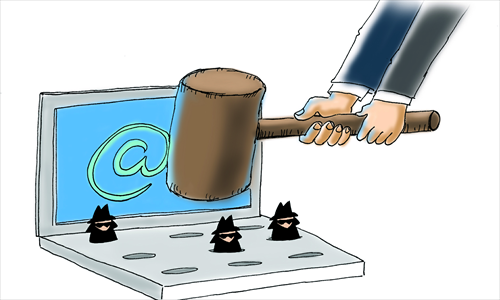Washington, Beijing take baby steps to crack down on cyber crime together

Illustration: Liu Rui/GT
The first China-US ministerial dialogue on fighting cyber crime held in Washington last week yielded positive outcomes. Both sides agreed to establish a hotline and reached consensus on guidelines on a joint China-US fight against cyber crime and related matters. The significance of the meeting is self-evident.
Convened under the agreements by Chinese President Xi Jinping and his US counterpart Barack Obama during Xi's US trip in September, the meeting is a critical first step in repairing fractured Beijing-Washington cyber relations. The two digital adversaries have gone through a number of disputes in cyber security in recent years. Accusing Beijing of engaging in hacks, the White House has threatened to impose sanctions on China for its alleged cyber theft.
Not until Meng Jianzhu, head of the Commission for Political and Legal Affairs of the CPC Central Committee, paid a visit to the US in early September, did the two sides put aside their differences and reach a five-point consensus. The two sides reiterated the agreements reached during Xi's US trip, including not conducting, or knowingly supporting commercial espionage, jointly fighting against cyber crimes, setting up a hotline to strengthen communication on cyber security and so forth. Yet, it has to be noted that these are just theoretic principles. The meeting in December is an implementation of the above agreements, and thus a critical starting point in China-US cyber cooperation.
Collaborating on cyber security is to the benefit of both Beijing and Washington. A number of factors have contributed to the shift of the two sides from being digital adversaries to partners. In the first place, the White House is working extensively with the Chinese government on a number of bilateral and multilateral issues. The need for cooperation is becoming increasingly urgent. Confrontation will do nothing for both sides. Constructively taking sensitive matters and disparities under control is the only way to solve the thorny problems.
In addition, cyber security deserves special attention. Different from other issues, security in cyberspace will not only influence the national strategic and economic benefits of both China and the US, but also is closely connected to everyone's life.
The Internet has become an indispensable part of the daily life of every citizen. Its significance cannot be overemphasized. Yet, an internationally-adaptable set of rules on the Internet management have not been established so far.
Thus, it is high time for Beijing and Washington to take the lead in jointly promoting the strategic management in the field of cyber security on the international arena. Establishing a new international mechanism in cyber space is of great significance in today's world.
It is worth mentioning that some Western countries are still criticizing China, arguing that a change in behavior has not been seen in China-linked cyber attacks since the September pledge. There are even reports claiming that Beijing is still engaging in hacks. These criticisms have no solid base. Trying to catch eyeballs, the Western media tends to make groundless accusations against China for a sensational effect.
In fact, the Chinese government has put tremendous efforts into promoting cyber cooperation with the US. The December meeting is a critical step forward. China-US law enforcement cooperation on cyber security has entered a new phase of progress following the meeting. China has also called for the dialogue mechanism as a main channel for information sharing in cracking down upon cyber crime. Therefore, the US, under this situation, ought to be more candid in collaborating with China, rather than spoiling the cooperative atmosphere.
The author is a senior researcher with the Institute of American Studies at the Chinese Academy of Social Sciences. opinion@globaltimes.com.cn